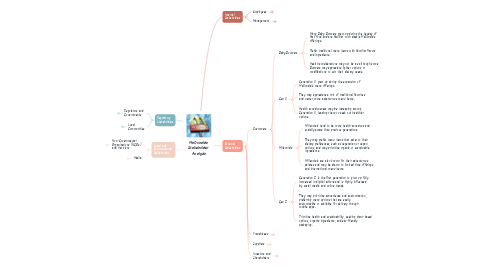
1. Regulatory Stakeholders
1.1. Regulators and Governments
1.1.1. Local, national, and international bodies that regulate and oversee McDonald's operations, including food safety and labor laws.
1.1.2. McDonald's must comply with various local, national, and international regulations, including those related to food safety, labor laws, and environmental protection.
1.2. Local Communities
1.2.1. The communities where McDonald's operates, which are impacted by its business practices, employment, and corporate social responsibilities.
1.2.2. The locations where McDonald's operates are impacted by its business through employment opportunities, economic activity, and corporate social responsibility initiatives.
2. Social and Environmental Stakeholders
2.1. Non-Governmental Organizations (NGOs) and Activists
2.1.1. Groups concerned with various issues such as environmental impact, animal rights, and public health.
2.1.2. These groups often scrutinize McDonald's on various fronts, including but not limited to, environmental impact, animal welfare, and public health.
2.2. Media
2.2.1. Outlets and platforms that report on McDonald's operations, influencing public perception and brand reputation.
2.2.2. As a high-profile company, McDonald's is often in the spotlight and how the media portrays the company can significantly impact its public perception and brand image.
3. Internal Stakeholders
3.1. Employees
3.1.1. Including everyone from restaurant staff to corporate executives.
3.1.2. Employees are crucial for the day-to-day operations of McDonald's and are directly impacted by the company's human resource policies, labor practices, and corporate culture.
3.2. Management
3.2.1. Senior executives and corporate leadership who are responsible for strategic decisions.
4. External Stakeholders
4.1. Customers
4.1.1. Baby Boomers
4.1.1.1. Many Baby Boomers grew up during the heyday of fast food and are familiar with classic McDonald's offerings.
4.1.1.2. Prefer traditional menu items with familiar flavors and ingredients.
4.1.1.3. Health considerations may not be as although some Boomers may appreciate lighter options or modifications to suit their dietary needs.
4.1.2. Gen X
4.1.2.1. Generation X grew up during the expansion of McDonald's menu offerings.
4.1.2.2. They may appreciate a mix of traditional favorites and newer, more adventurous menu items.
4.1.2.3. Health consciousness may be increasing among Generation X, leading them to seek out healthier options.
4.1.3. Millennials
4.1.3.1. Millennials tend to be more health-conscious and socially aware than previous generations.
4.1.3.2. They may prefer menu items that cater to their dietary preferences, such as vegetarian or vegan options, and may prioritize organic or sustainable ingredients.
4.1.3.3. Millennials are also known for their adventurous palates and may be drawn to limited-time offerings and international menu items.
4.1.4. Gen Z
4.1.4.1. Generation Z is the first generation to grow up fully immersed in digital culture and is highly influenced by social media and online trends.
4.1.4.2. They may prioritize convenience and customization, preferring menu options that are easily customizable or available for delivery through mobile apps.
4.1.4.3. Prioritize health and sustainability, seeking plant-based options, organic ingredients, and eco-friendly packaging.
4.2. Franchisees
4.2.1. A significant portion of McDonald's restaurants are operated by franchisees who buy into the business model and run McDonald's branded outlets.
4.2.2. These stakeholders are critical as they represent the brand locally and are directly affected by McDonald's business strategies, franchise policies, and support systems.
4.3. Suppliers
4.3.1. Companies and individuals who provide goods and services to McDonald's, including food products and packaging.
4.3.2. McDonald's relies on a wide network of suppliers for food products, packaging, and other goods. These stakeholders are affected by McDonald's purchasing decisions and its standards for quality and sustainability.
4.4. Investors and Shareholders
4.4.1. Individuals and entities that invest capital in McDonald's in exchange for equity or debt securities.
4.4.2. These stakeholders are interested in the financial performance of the company. Their primary concerns are profitability, dividends, and the growth potential of their investments.
